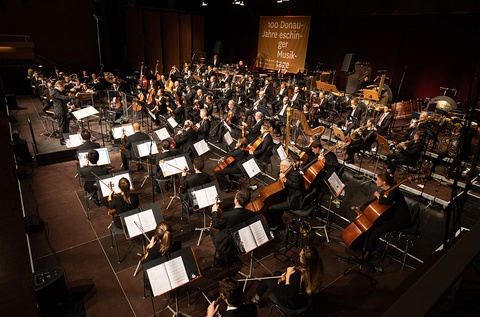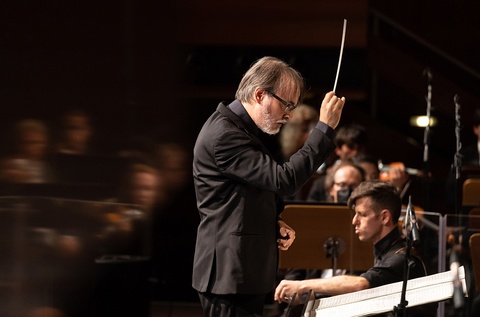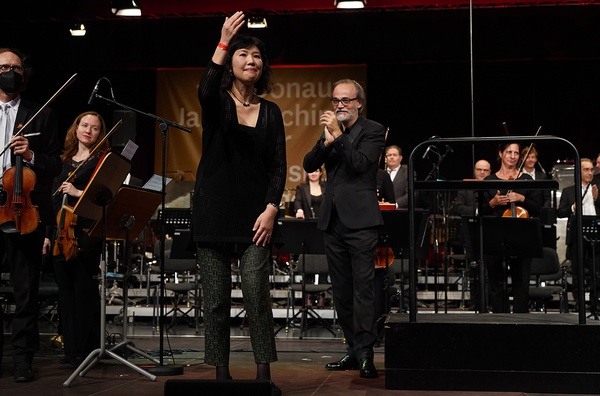Intrusion
de Misato Mochizuki (enregistré au Festival de Donaueschingen, 2021)

Depuis sa création en 1977, l’Ircam a pour mission fondamentale de susciter une interaction féconde entre recherche scientifique, développement technologique et création musicale contemporaine. Cette articulation constitue le principal axe structurant de l’ensemble de ses activités. L’un des enjeux majeurs est de contribuer, par les apports des sciences et techniques, au renouvellement de l’expression musicale.…
L'Ircam est un centre de recherche internationalement reconnu dont l'activité est consacrée à la création de nouvelles technologies pour la musique et le son. L'institut offre un environnement expérimental unique permettant aux artistes d'enrichir leur expérience sonore via les concepts développés et exprimés grâce aux nouvelles technologies.
Au service des missions de recherche et de création de l’Ircam, la transmission cherche à éclairer le sens actuel et en devenir des interactions entre arts, sciences et technologie, mais aussi à partager ses modèles de connaissance, ses savoir-faire et ses innovations vers un public le plus large possible.
Au cœur d’enjeux sociétaux et économiques croisant culture et technologies de l’information, les recherches accueillies à l’Ircam se présentent dans le paysage international de la recherche comme pôle de référence interdisciplinaire autour des sciences et technologies du son et de la musique et s’exposent en permanence aux nouveaux be…



Depuis sa création en 1977, l’Ircam a pour mission fondamentale de susciter une interaction féconde entre recherche scientifique, développement technologique et création musicale contemporaine. Cette articulation constitue le principal axe structurant de l’ensemble de ses activités. L’un des enjeux majeurs est de contribuer, par les apports des sciences et techniques, au renouvellement de l’expression musicale.…
L'Ircam est un centre de recherche internationalement reconnu dont l'activité est consacrée à la création de nouvelles technologies pour la musique et le son. L'institut offre un environnement expérimental unique permettant aux artistes d'enrichir leur expérience sonore via les concepts développés et exprimés grâce aux nouvelles technologies.
Au service des missions de recherche et de création de l’Ircam, la transmission cherche à éclairer le sens actuel et en devenir des interactions entre arts, sciences et technologie, mais aussi à partager ses modèles de connaissance, ses savoir-faire et ses innovations vers un public le plus large possible.
Au cœur d’enjeux sociétaux et économiques croisant culture et technologies de l’information, les recherches accueillies à l’Ircam se présentent dans le paysage international de la recherche comme pôle de référence interdisciplinaire autour des sciences et technologies du son et de la musique et s’exposent en permanence aux nouveaux be…


Fondées voilà 100 ans par la Maison de Fürstenberg, seigneur des lieux et propriétaire des brasseries Fürstenberg qui ont longtemps fait vivre la petite ville, les « Journées Musicales de Donaueschingen » sont aujourd’hui l’un des plus prestigieux festivals de musique contemporaine au monde. À l’instar du Danube, qui n’y est qu’un mince ruisseau préfigurant difficilement le plus grand fleuve d’Europe qu’il deviendra, certains compositeurs qui y ont éclos sont aujourd’hui des références absolues. Au cours des cinq journées qu’il couvre à la mi-octobre — à raison de cinq concerts par jour, et en moyenne trois créations mondiales par concert —, se réunit là, s’ajoutant à un public agréablement varié pour un festival de musique contemporaine, la plus grande concentration au monde de compositeurs, programmateurs et ensembles spécialisés. Et parmi eux, des équipes de l’Ircam, naturellement.
Cette année du centenaire est d’ailleurs une année faste à cet égard, puisque l’Ircam est producteur, coproducteur ou commanditaire de pas moins de trois pièces de la programmation.
Dans l’ordre chronologique, la première est Intrusion (Part I) de la compositrice japonaise et francophile Misato Mochizuki, avec électronique Ircam réalisée par Robin Meier. Confiée, vendredi 15 octobre, aux bons soins de l’Orchestre Symphonique du Luxembourg sous la direction d’Ilan Volkov, elle partage l’affiche avec trois autres créations : un concerto pour guitare électrique du belge Stefan Prins, Hirn, d’Enno Poppe, sorte de fanfare délirante, alternant effets de sirènes et imitation d’effets Doppler aux accents tout à la fois ironiques et alarmistes, et le concerto pour piano et ensemble World as Lover, World as Self de Liza Lim, belle partition polystylistique dégageant un doux parfum de mélancolie.


L’Orchestre Symphonique du Luxembourg et le chef Ilan Volkov © SWR/Ralf Brunner
Un voisinage au sein duquel l’œuvre de Mochizuki détonne un brin. En pénétrant dans Intrusion, le premier sentiment est celui d’un chaos organisé. Additionnant de multiples petits gestes, relativement homogènes dans leur ensemble, l’orchestration pointilliste empile des boucles tournoyantes, qui gagnent peu à peu tout l’espace sonore au moyen de la spatialisation. S’y ajoute le bruissement d’échantillons sonores concrets : appels d’oiseau, bruits de la forêt.
Rapidement, on a l’impression d’être dans la peau d’un de ces héros de contes de fées qui doivent traverser une forêt sombre et menaçante, mais auxquels on a enjoint d’avancer sans jamais se retourner, de ne surtout pas regarder derrière eux.
Au début, la promenade est douce, presque guillerette, mais à mesure que l’on s’enfonce dans les frondaisons, l’inquiétude monte, l’anxiété bourdonne aux oreilles.  Bientôt, ce sont des vagues successives de détresse qui semblent déferler sur le public stupéfait. Le cerveau tente d’apprivoiser l’étrangeté, de déconstruire la peur afin de mieux l’exorciser. Il saisit au vol une flûte imitant l’un des chants d’oiseau diffusé par l’électronique, comme pour se raccrocher à un élément rassurant, ou à tout le moins compréhensible. L’électronique se fait dans le même temps de plus en plus angoissante et profonde, envahissant tout l’espace. Sur scène, les instruments de l’orchestre sont comme sur la défensive, donnant le sentiment d’être des animaux terrifiés, chassés, cernés par des prédateurs invisibles. Un silence soudain interrompt le vacarme.
Bientôt, ce sont des vagues successives de détresse qui semblent déferler sur le public stupéfait. Le cerveau tente d’apprivoiser l’étrangeté, de déconstruire la peur afin de mieux l’exorciser. Il saisit au vol une flûte imitant l’un des chants d’oiseau diffusé par l’électronique, comme pour se raccrocher à un élément rassurant, ou à tout le moins compréhensible. L’électronique se fait dans le même temps de plus en plus angoissante et profonde, envahissant tout l’espace. Sur scène, les instruments de l’orchestre sont comme sur la défensive, donnant le sentiment d’être des animaux terrifiés, chassés, cernés par des prédateurs invisibles. Un silence soudain interrompt le vacarme.
Puis la musique reprend, mais sur un autre régime — comme si la lumière enfin venait à éclairer le champ de bataille, faisant fuir tous les belligérants. Et l’on se rappelle alors que le titre de l’œuvre est Intrusion (Part I), suggérant que, sans doute, une deuxième partie viendra se greffer ici pour terminer le voyage.
Photo : La compositrice Misato Mochizuki © SWR/Ralf Brunner
Par Jérémie Szpirglas, octobre 2021
de Misato Mochizuki (enregistré au Festival de Donaueschingen, 2021)

